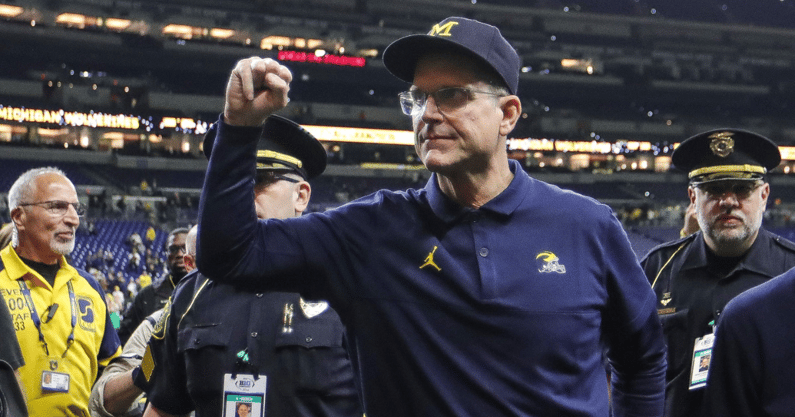Michigan's Jim Harbaugh: 'Don't forget to give them the share of the revenue'

Speaking to ESPN in front of a national audience, Jim Harbaugh again brought up revenue sharing.
The Michigan head coach used his platform Sunday to again call for athletes to earn a share of television revenue. While he was assessing his team’s No. 1 overall seed in the College Football Playoff, he turned the tables around to emphasize his players and how they should receive a cut of TV revenue.
“It’s not about any coach, it’s about the players,” he said, a day after securing his third consecutive Big Ten title. “I love the way you’re talking about the players, that’s who everyone comes to see. Those are the people who put in the work. I hear a lot of the controversy about who should’ve been in, who shouldn’t of been in it. It’s going to be fortunate that the next year is going to be an expanded playoff and a true champion – it’s just going to be better.
“As you make those comments, I want you to remember – it’s the players. Don’t forget to give them a share of the revenue.”
The ninth-year Michigan head coach has been a vocal supporter of athletes’ receiving dollars for more than a year. The player-turned-coach has used major moments to talk about his belief that athletes should deserve a piece of the revenue pie.
On a conference call with reporters last weekend, Harbaugh said he would be willing to take less money for his players to have a share. And on Sunday, he again emphasized that athletes should earn a share of the revenue.
At Big Ten Media Days in July, Harbaugh called for the NCAA to give NIL a chance before reigning it in. NCAA president Charlie Baker and conference commissioners, athletic directors and coaches have traveled to Capitol Hill the last six months, pushing Congress to enact an NIL mandate.
As the college football landscape has shifted, most of the moves have been fueled by TV dollars. In the case of the Pac-12’s demise, lack thereof. The demise of the conference began when USC and UCLA took up the cash-rich Big Ten on its offer.
Top 10
- 1New
Shedeur Sanders reacts
To going undrafted in 1st round
- 2
Picks by conference
SEC, Big Ten dominate NFL Draft
- 3Hot
Joel Klatt calls out
'Trash' Shedeur Sanders narrative
- 4
10 Best Available Players
After NFL Draft 1st Round
- 5Trending
ESPN roasted
For Shedeur Sanders empty couch
Get the On3 Top 10 to your inbox every morning
By clicking "Subscribe to Newsletter", I agree to On3's Privacy Notice, Terms, and use of my personal information described therein.
Starting in 2024, the Big Ten, traditionally a conference based in the Midwest, will span coast to coast. The SEC and Big Ten each begin new TV contracts this year, with Big Ten programs expected to receive anywhere from $80 to $100 million per year. The current college sports model does not pay athletes a dollar from the contracts. Athletes were not able to profit off their name, image and likeness until July 2021.
Revenue sharing, employee status enter national conversation
The fight over employee status has also started. The National Labor Relations Board’s Los Angeles is moving forward against the NCAA, Pac-12 and USC. The plaintiffs in Johnson v. NCAA, former Villanova football player Trey Johnson and other Division I athletes, are asking that athletes be deemed employees subject to the Fair Labor Standards Act.
Revenue sharing could be inching closer. Many in the college sports landscape believe athletes earning a share of TV revenue is inevitable.
The Collective Association discussed the barebones of a revenue-sharing model with the NCAA and SEC in July. Now at more than 24 members, the founding group includes collectives from Tennessee, Georgia, Ole Miss, Florida State, USC, Michigan and Penn State.
The thought is a portion of TV revenue should be distributed by conferences to an “official” institution collective in equal shares. For example, an SEC collective could receive $5 to $10 million annually. This could theoretically relieve pressure for boosters to constantly produce more funds, as has been the case in the last 29 months. From there the collective distributes the money to athletes.
Many believe NIL serves as the stopgap between amateurism and revenue sharing. How revenue sharing comes to be remains to be seen. But as Jim Harbaugh reminded the nation once again Sunday, it’s only a matter of time.